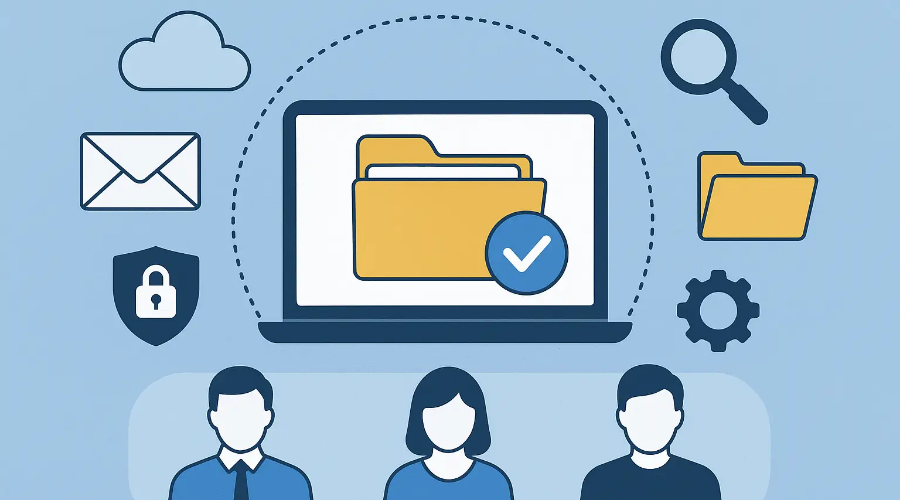Email Archiving: A Complete How-To Guide for IT, Compliance, and SMBs

Did you know that over 300 billion emails are sent every day, yet most organizations struggle to retain, secure, and access the ones that truly matter? If you're an IT manager, compliance officer, or small business owner, chances are you've already run into the challenges of bloated inboxes, regulatory audits, or the panic of not finding a critical email when it's needed most. That's where email archiving comes in — not just as storage, but as a strategy to protect, organize, and future-proof your business.
In this guide, we'll break down what email archiving is, why it matters, and exactly how to set up a process that saves time, reduces risk, and improves productivity.
What Is Email Archiving, Really?
At its core, email archiving is the process of systematically storing, indexing, and securing email communications so they can be quickly retrieved later. Unlike traditional backups that simply copy data, archiving solutions make emails searchable, tamper-proof, and compliant with legal standards.
For IT managers and admins, this means reducing server loads and simplifying data management. For compliance and legal teams, email archiving cloud ensures every email is preserved in a way that stands up to audits or eDiscovery. And for business owners, it delivers peace of mind knowing company records won't vanish if an inbox gets deleted.
Why Email Archiving Is No Longer Optional
Here's why organizations of all sizes can't afford to ignore archiving:
- Regulatory Compliance: Industries like healthcare, finance, and legal are governed by strict retention laws (HIPAA, FINRA, GDPR, etc.). Failure to retain or produce emails can result in massive fines.
- Litigation & eDiscovery: Legal teams often need rapid access to specific emails during disputes. Archiving ensures they're searchable and admissible.
- Data Security: Archived emails are often stored in secure, encrypted environments with strict access controls.
- Server Performance: Offloading older emails reduces mailbox sizes and improves system efficiency.
- Knowledge Retention: Departing employees doesn't mean departing institutional knowledge — archiving keeps valuable correspondence intact.
Step-by-Step: How to Implement Email Archiving
Step 1: Define Business and Compliance Requirements
- Identify which regulations apply to your organization.
- Set retention policies (e.g., 3 years, 7 years, indefinite).
- Decide who will have access to archives (admins, legal teams, HR, etc.).
Step 2: Choose Between On-Premise and Cloud Archiving
- On-Premise: More control, but higher costs for hardware, maintenance, and scaling.
- Cloud: Flexible, scalable, lower upfront costs, and automatic updates.
Step 3: Select the Right Archiving Tool
Consider the following when evaluating tools:
- Search and indexing capabilities.
- Compliance certifications.
- Ease of integration with your email platform (Exchange, Office 365, Gmail).
- Storage scalability and cost.
- Security features like encryption, multi-factor authentication, and audit logs.
Step 4: Plan Migration and Implementation
- Clean up existing mailboxes before archiving.
- Migrate emails in phases to reduce downtime.
- Test indexing and retrieval features before going live.
Step 5: Train Users and Monitor Ongoing Compliance
- Provide staff training on how to retrieve archived emails.
- Regularly review retention policies.
- Audit the system to ensure security and compliance.
The Best Cloud Email Archiving Tools Today
Several cloud-based solutions dominate the market:
- Microsoft 365 Compliance Center offers built-in archiving, retention policies, and eDiscovery tools.
- Jatheon provides enterprise-grade archiving and ediscovery software for organizations in regulated industries and beyond.
- Google Vault provides secure storage and powerful search capabilities for Gmail and Google Workspace.
- Mimecast is a popular third-party tool for enterprises, with layered security and disaster recovery.
- Proofpoint Enterprise Archive is known for compliance, analytics, and scalability.
Each solution has its strengths: Microsoft and Google are great if you're already in their ecosystems, while Mimecast and Proofpoint shine for organizations with stricter compliance needs. Jatheon captures, stores, and enables easy search across a wide range of digital communication channels — including email, WhatsApp, iMessage, mobile messages, collaboration platforms, and social media.
Common Mistakes to Avoid When Archiving Emails
- Treating Archiving as Backup: Backups restore systems after crashes, but they're not built for compliance or fast retrieval.
- Overlooking User Access: If your system is too complex, staff won't use it effectively.
- Not Updating Policies: Laws and regulations evolve, your archiving strategy must too.
- Ignoring Costs of Retrieval: Some vendors charge fees for exporting archived data, factor this in early.
How Email Archiving Benefits IT Managers and System Admins
For IT teams, email archiving is more than compliance — it's about efficiency:
- Reduces the load on mail servers.
- Cuts down time spent on PST file management.
- Provides centralized control and monitoring.
- Improves disaster recovery capabilities.
Interestingly, organizations that adopt archiving often uncover other efficiencies too. For example, companies investing in Excel consulting services to optimize reporting workflows frequently find that integrating archived email data improves business intelligence dashboards and reporting accuracy.
Email Archiving for Compliance Officers and Legal Teams
When legal or compliance officers need to conduct an investigation, time is critical. Archiving allows them to:
- Search millions of emails in seconds using keywords, date ranges, or custodians.
- Place legal holds on specific data to prevent deletion.
- Ensure archived emails meet admissibility standards in court.
Some teams even incorporate feedback loops after audits — circulating a quick survey link internally to gauge how easy it was to locate necessary communications. This helps fine-tune processes and training.
The Small & Medium Business (SMB) Perspective
Many SMB owners assume email archiving is only for large enterprises, but the truth is the risks of data loss and compliance failures are just as real. Affordable cloud-based tools mean SMBs can:
- Meet customer and industry requirements without expensive infrastructure.
- Protect themselves in case of disputes with vendors or clients.
- Streamline IT operations without hiring large teams.
The Role of AI and Email Verification in Modern Archiving
As email volumes grow, AI-powered archiving tools like Jatheon are emerging to streamline classification, detect anomalies, and even flag potential compliance risks automatically. Instead of relying solely on manual tagging or keyword searches, AI can recognize patterns in communication—making retrieval faster and smarter. Alongside AI, email verification features ensure that archived messages are authentic, unaltered, and traceable to their source. This combination not only strengthens legal defensibility but also reduces the chances of fraudulent or spoofed emails entering the archive in the first place.
Email Archiving Across Different Industries
The role of email archiving shifts depending on the industry. In healthcare, for instance, archiving supports HIPAA compliance by securing patient communications while ensuring medical staff can access records instantly. In financial services, strict regulations like SEC and FINRA make archiving critical for audit readiness and fraud investigations. Law firms rely heavily on archiving to manage client communications, build defensible cases, and avoid accusations of spoliation. Even in education, archiving ensures compliance with FERPA and helps schools manage communications between administrators, parents, and students.
Future-Proofing Industry Operations with Archiving
Beyond compliance, archiving adds value by unlocking insights unique to each sector. A manufacturing company might analyze archived supplier emails to spot recurring delays or disputes. A retail chain could use archived customer communications to track long-term service issues or preferences. And in tech startups, archiving ensures continuity by preserving knowledge as teams scale quickly and employees move between projects. In every industry, email archiving isn't just about storing data — it's about building resilience and gaining visibility that fuels smarter decision-making.
Best Practices for Long-Term Archiving Success
- Automate Policies: Reduce human error by automating retention and deletion.
- Encrypt Everything: Protect sensitive data both at rest and in transit.
- Regular Audits: Schedule compliance checks and mock retrieval exercises.
- Stay Updated: Keep up with regulations in your industry.
- Plan for Ex-Employees: Ensure their mailboxes are archived before accounts are deactivated.
Final Thought:
Email archiving isn't just a "nice-to-have” — it's a business-critical process that helps IT, compliance, and business leaders safeguard communication, stay audit-ready, and boost operational efficiency. By taking a structured approach and choosing the right tools, you'll turn what feels like a storage problem into a strategic advantage.
Frequently Asked Questions (FAQ)
Q1. What's the difference between email backup and email archiving?
- Backups are designed to restore systems in case of failure, while archiving focuses on long-term storage, compliance, and quick retrieval.
Q2. How long should emails be archived?
- It depends on regulations and business needs. Many industries require retention from 3–7 years, but some organizations archive indefinitely.
Q3. Can employees delete emails if they're archived?
- Typically, no. Archived emails are stored separately in a tamper-proof system. Users can delete from their inbox, but the archive remains intact.
Q4. Is email archiving expensive?
- Costs vary, but cloud-based solutions offer scalable, subscription-based pricing that's affordable for SMBs and cost-efficient for enterprises.
Q5. Do archived emails slow down mail servers?
- Quite the opposite. Archiving reduces the load on servers by moving older emails off the active system.
Q6. Is cloud email archiving secure?
- Yes! Reputable providers use encryption, access controls, and redundancy. Always check compliance certifications (ISO, SOC, HIPAA, GDPR).



